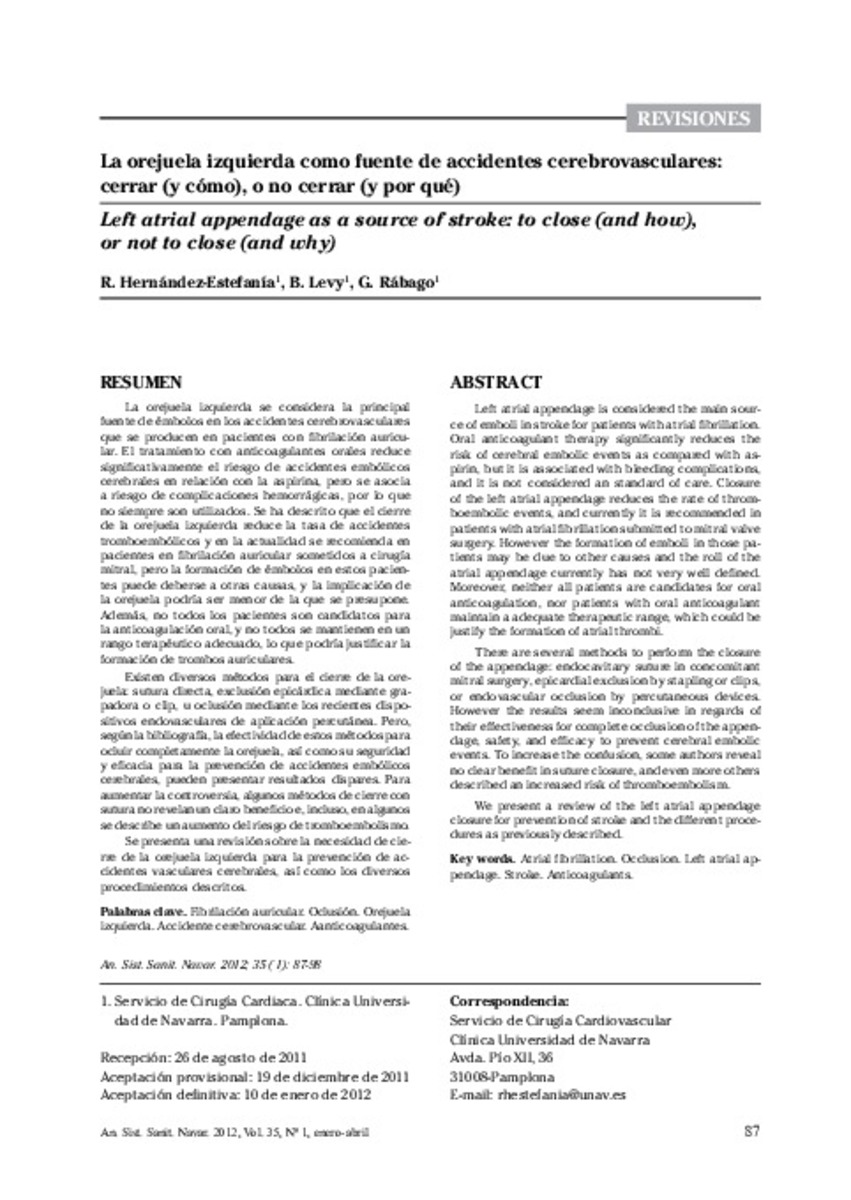Full metadata record
| DC Field | Value | Language |
|---|---|---|
| dc.creator | Hernandez-Estefania, R. (Rafael) | - |
| dc.creator | Levy-Praschker, B.G. (Beltran G.) | - |
| dc.creator | Rabago, G. (Gregorio) | - |
| dc.date.accessioned | 2012-05-30T10:25:33Z | - |
| dc.date.available | 2012-05-30T10:25:33Z | - |
| dc.date.issued | 2012-01 | - |
| dc.identifier.citation | Hernandez-Estefania R, Levy B, Rabago G. La orejuela izquierda como fuente de accidentes cerebrovasculares: cerrar (y cómo), o no cerrar (y por qué). An Sist Sanit Navar 2012 enero-abril;35(1):87-98. | es_ES |
| dc.identifier.issn | 1137-6627 | - |
| dc.identifier.uri | https://hdl.handle.net/10171/22321 | - |
| dc.description.abstract | The left atrial appendage is considered the main source of emboli in strokes in patients with atrial fibrillation. Oral anticoagulant therapy significantly reduces the risk of cerebral embolic events compared to aspirin, but it is associated with bleeding complications, and is not always used. Closure of the left atrial appendage reduces the rate of thromboembolic events, and it is currently recommended in patients with atrial fibrillation submitted to mitral valve surgery. However, the formation of emboli in these patients may be due to other causes, as the role of the atrial appendage could be less important than is assumed. Moreover, not all patients are candidates for oral anticoagulation, and not all are kept in a proper therapeutic range, which could justify the formation of atrial thrombi. There are several methods for performing the closure of the appendage: direct suture in concomitant mitral surgery, epicardial exclusion by stapling or clips, or endovascular occlusion by percutaneous application. However, the results seem inconclusive with regards to their effectiveness for complete occlusion of the appendage, safety, and efficacy in preventing cerebral embolic events. To add to the confusion, some authors reveal no clear benefit in suture closure, and even describe an increased risk of thromboembolism. We present a review of left atrial appendage closure for the prevention of strokes, as well as the different procedures described above. | es_ES |
| dc.language.iso | spa | es_ES |
| dc.publisher | Gobierno de Navarra. Departamento de Salud | es_ES |
| dc.rights | info:eu-repo/semantics/openAccess | es_ES |
| dc.subject | Atrial fibrillation | es_ES |
| dc.subject | Occlusion | es_ES |
| dc.subject | Left atrial appendage | es_ES |
| dc.subject | Stroke | es_ES |
| dc.subject | Anticoagulants | es_ES |
| dc.title | La orejuela izquierda como fuente de accidentes cerebrovasculares: cerrar (y cómo), o no cerrar (y por qué) | es_ES |
| dc.title.alternative | Left atrial appendage as a source of stroke: to close (and how), or not to close (and why) | es_ES |
| dc.type | info:eu-repo/semantics/article | es_ES |
| dc.type.driver | info:eu-repo/semantics/article | es_ES |
| dc.identifier.pmid | 22552130 | - |
Files in This Item:
Statistics and impact
Items in Dadun are protected by copyright, with all rights reserved, unless otherwise indicated.






